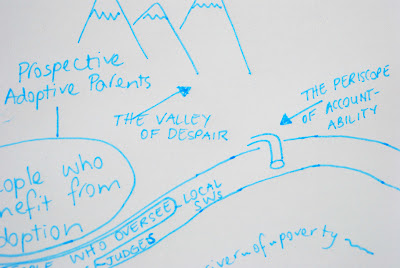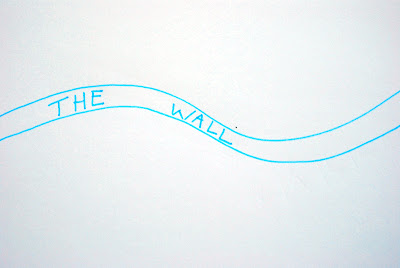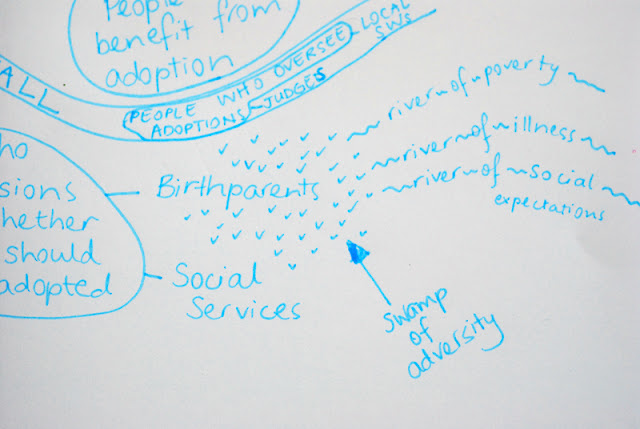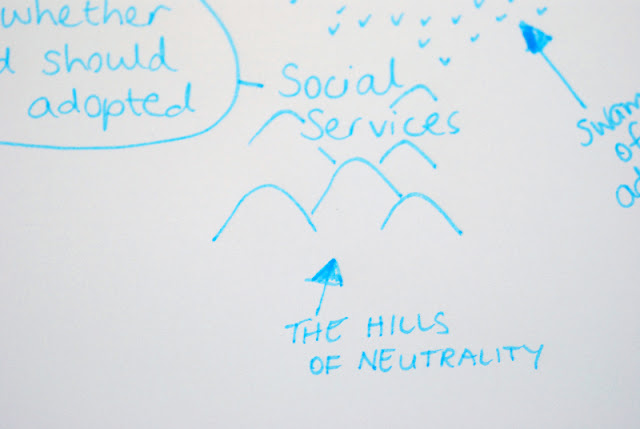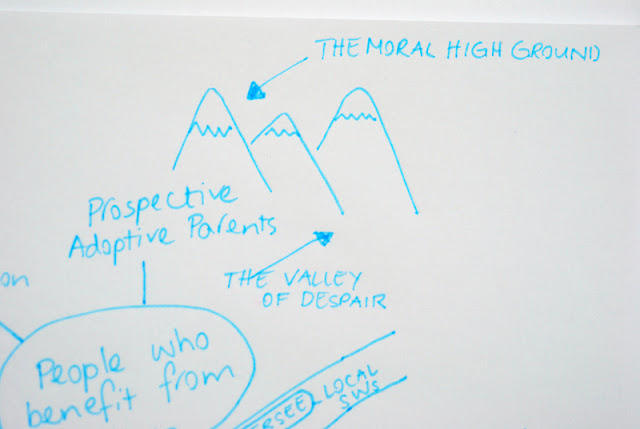
In my mind, this wall we've been talking about is made up of equal parts law and moral obligation, and where it stands tall, it does so because of a combination of good regulation and good behaviour. This bad end of the wall is where those two start to run out. I've called the area at the very end of the wall, where it has crumbled totally, 'The Open Plains of No Regulation'. In some countries, especially when international adoption is in its infancy, there are very few laws in place and it is very, very easy to behave unscrupulously. People can walk right around the wall because it's not really there. Of course, not all people do behave unscrupulously in those situations, but it's an environment that makes bad behaviour much easier, and therefore much more likely. In this sort of situation, an agency representative (or, more likely, a PAP) could easily go to a village orphanage and agree that a particularly cute child probably does need a new home, and, since there are no formal regulations in place surrounding abandonment / relinquishment, arrange to adopt the child (or facilitate the adoption) with very little official interference. I think this situation has been getting less and less common over the last few decades, all around the world, for which we should all be profoundly grateful. But it can still happen. There's always a lowest common denominator, a group of bottom-dwellers who will do all they can to get around the law. But it still needs to be there. Good regulation is absolutely critical if the interests of children are to be looked after.
The two bigger risks, especially in established international adoption programmes, are the holes in the wall caused by the 'Tunnel of Bribery' and the 'Pit of Coercion'. These are two of the most obvious ways that people who benefit from adoption can act to influence the people who are the official decision makers. Coercion can take various forms, but when a parent is led to believe that they
should relinquish their child, that it would be the
loving thing to do, I think that's coercion's most common face. I think the most difficult thing about coercion is that sometimes it seems that the people doing it genuinely believe that they are acting in a child's best interest. They may truly believe that a particular woman's child would be better off at school in Milwaukee or Stockholm than with her on the streets of Kampala or Addis Ababa. They may honestly think that a young, unmarried woman will have the chance to re-start her life if she bids her baby farewell, and that this would be much better than her trying to make her way as a single mother in a society where they are stigmatised. In these situations, the agency may not be looking for financial gain, and they may even be well intentioned, but if they are working to convince a mother to say goodbye to a child she wishes to parent, the behaviour is unethical nonetheless because
it is not their decision to make. They benefit from it, and they should not be trying to influence it.
The tunnel of bribery causes holes in the wall when
people use money to influence decision-makers. This could be an orphanage offering a mother money (or food) if she relinquishes her child. It could be an agency or a PAP offering perks to keep a pet social worker sweet. Either way, when the people who benefit from adoption use their money (or some other form of power) to increase the number of children who are deemed adoptable, this is probably the most blatant, the most obvious form of unethical behaviour.
(I've been thinking about this question of money, though, and I've come to think that it can be a bit of a red herring in adoption discussions. Forgive the digression, but - if my agency gives money to a social worker so that she will be more likely to determine that a child is abandoned (when really, the child's mother is coming back and everybody knows it) that's a clear breach of the wall and of adoption ethics. However, what about when my adoption agency fleeces
me, on its own side of the wall
? What about if my agency director is taking a big chunk of my fee and using it to buy expensive cars, vacations, a swimming pool? What about when the agency's in-country employees are overcharging me and profiteering and asking for extra cash in order to do tasks that they have already been paid for? Or, on the other side of the wall, what about orphanages who are processing adoptions legally and not getting involved in the decision-making but who are neglecting the children, keeping some of the money for care back and lining their own pockets? How about if an orphanage driver charges the agency a vast, ridiculous sum of money in order to transport children to the agency centre? My opinion is this: All of those things are bad. Some of them are criminal. Several of those people should be in jail, especially the orphanage guy who is stealing money that should be used to feed
hungry children. However - that's not what I'm talking about, personally, when I'm talking about whether an adoption was ethical. I think that sometimes 'ethics' is used to talk about how well people behave towards the other people on their side of the wall, how well children are cared for, how being with an agency makes us feel. But all these awful things I listed- and they are awful things - aren't really the heart of the matter, in my eyes.
They are extremely important. But adoption ethics, I think, is first and foremost about answering the question of whether a child should have been adopted in the first place. Whether a child is treated well or badly while waiting to be adopted is critically important, as is whether my adoption agency is trying to defraud me of all my money. But I don't think those things are what makes an adoption - the legal transfer of a child from one family to another - ethical or not. Okay, digression over).
All of that, of course, leads me to admit that I don't really know what to do, schematically, with orphanages; I think that the murkiest bit of the map is probably in-country orphanage care. In fact, I haven't even given orphanages a separate space on the map. I probably should have, but I drew the whole thing a few days ago and now can't find the blue felt-tip pen I used. Please, do your best to imagine that orphanages have their own bubble next to agencies. Close your eyes and draw it with the felt-tip-pen of your imagination, okay?
 |
| Use the light blue pen of your mind. Got it? |
I think that if adoptions are going to be squeaky-clean, people who run the orphanage, who manage the money, should not have anything -
anything- to do with making final decisions about placing children for international adoption. Is this realistic? I don't know. I suspect that there is a spectrum, depending on the country, depending on the local infrastructure, depending on the orphanage. Where the orphanages have more power, more chances to get their hands mucky, the role of the watchers on the wall becomes increasingly important. (I haven't really discussed this group of people because their role - as independent, neutral adjudicators and enforcers - is pretty self-explanatory. Exactly what they do, and how well they do it, will vary by country and person. It should not be this way, but I think it probably is). I have no doubt that there are many orphanages where the only times that children in their care are sent for intercountry adoption is when an independent person with no interest in the outcome deems it to be in the child's best interest. If that orphanage receives reasonable funding from an agency for the care of the child, no ethical boundaries are crossed because the orphanage had nothing to do with deciding that child would be placed for adoption.
I also have no doubt that there are other orphanages where the people in charge have no qualms about pushing for particular children to enter the adoption pipeline. I am sure that there are some where the mothers who come for help are given a spiel about how that baby they are cradling could have a much better life (with an education!) in America. I am sure there are cases when the director then phones his favourite agency, tells them to refer the child and pockets a big chunk of the money passed to him for the child's care. This second situation is clearly and unarguably unethical. He pushed for the child to be relinquished, and then he benefits from that decision. I'm sure it sometimes happens, but it never, never should.
It may not always be as clear-cut as this, but these issues are one of the main reasons that I think agencies have to do more than simply hide behind the wall. They have to respect it, but they can't just put their backs to it and hunker down and think that is enough. This introduces the final feature that I have drawn on the wall:
the periscope of accountability*.
An agency may not be actively facilitating child recruitment, but if they aren't interested in finding out what their partners in the field are doing, that's not good enough. So: agencies must not broach the wall, but if they care about ethics, they have to care about what is happening on the other side. For each child they place, I believe they have a responsibility to check that nobody on the
deciding who gets adopted side of the wall is doubling up and
benefiting, too. They've got to make good use of the periscope. Because if agencies don't do this, who will? Embassies have a responsibility to check adoption details at the point where a visa is issued, but (as someone else said recently, and I wish I could remember who) these people are in the immigration business, not the adoption business. Their job is to check that a child is eligible to immigrate to their new country, not really to check whether or not they should be emigrating from the old. If the agency is going to be referring a child to new parents, the agency should be checking - as far as is humanly possible - that everything that happened before the child reached them was both legal and, yes, ethical.
It's a pretty obvious point to make that different agencies will be at different points along the wall. I suppose that, in real life, this wall turns into something of a spectrum. One one side, it ranges from those who are doing everything possible to breach the wall at one end, to those with their eyes glued to the periscope of accountability at the other. On one extreme of the other side of the wall, there are those standing next to those breaches, hoping for kickbacks. Those committed to looking after the interests of children belong at the other.
I think it's important to say that even the very worst agencies can end up facilitating ethical adoptions. By the power of statistics and sheer dumb luck, some of the children that they place in new homes probably really do need them. Similarly, even the very best, most ethical agencies can unknowingly place children who are the victims of other people's lies. Social workers can lie. Birthfamilies can lie. Agencies are not
always the bad guys in adoptions that should never have happened. There is no way of managing this risk down to zero. We live in an imperfect world. ("
Imperfect solutions for an imperfect world!" Now
that's an adoption agency slogan I'd like to see). But it can definitely be minimised, and I think a crucial first step is finding out as much as possible about where an agency stands along the wall. Are they tapping on the bricks, looking for cracks? Are they standing with their backs to the wall, fingers in their ears, ignoring warning bells? Or are they standing with their eyes glued to the periscope? The last group should be ensuring, firstly, that nothing they do will ever pressure any decision-makers into classifying a child as 'adoptable', but also that they won't participate in a process where anybody else has done this. I want to say that this last group is also less likely to use the word 'angels' anywhere on their website to describe children, but that would be flippant. So I won't.
So, if that's all in place, is that the best thing we can do for children? If we respect the wall, and cling tightly to the periscope, is that it? Is
a really, really ethical adoption the highest thing we should be striving for? Is an adoption, facilitated by independent professionals, what every young mother dreams of for her child? Is that the best, the only thing we can do for children in need across the world? Well, no. Obviously. All that an ethical adoption system can do is pick up the pieces of tragedies that have already happened - this is a large part of what makes it ethical. If we want to stop the tragedies happening, we need to look elsewhere for solutions. Too many adoptions happen because women find themselves in the swamp of adversity, fed by those three rivers of poverty, illness and social expectation. Building a nice high, tight, wall, a perfect adoption system, does nothing about those three rivers. They will continue to flow. Nothing will change. Families will continue to break apart. To address those three rivers, we need to think beyond the wall. We need something else: we need a dam.
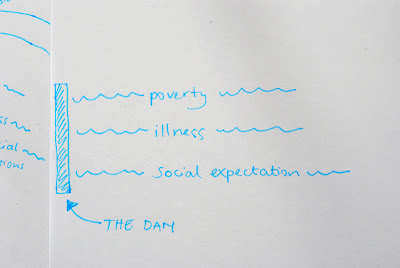
The best way to address a problem is not to pick up the pieces, it's to stop it happening in the first place. If we are looking to have long term, big-picture impact on children's lives, we want the swamp of adversity to dry up. We have to build a dam. What does that look like? Here are some suggestions:
Building the dam means working for family reunification. It means working for better healthcare (especially maternal and child health, and sanitation). It means working for education (again, especially for women). It means - and this isn't something that we, in other countries, have much power over - fair government. If those things are in place, rivers start to dry up. The orphan crisis (although I have an allergy to the word
orphan, I can't think of a better one here) is addressed in the best possible way because steps are taken to prevent children ever being orphaned.
There are lots of ways that people can help to build the dam. Some of them are
here.
Here is another. Also,
this. However - this post isn't about the joys of microfinance, clean water or women's education - although those are all fascinating topics - it's about adoption, and adoption does nothing to help build a dam. So, the reason I bring up the dam here is that I think that ethical adoptions start with a wall, and
I think that in some cases people are looking for a dam instead. This goes two ways.
Firstly: I get the impression, sometimes, that when people say that their agency is 'really, really ethical', what they mean is that their agency is spending a lot of energy and money building the dam. Their agency funds free health care. Their agency does all kinds of nice things that help people. And maybe they do help people, and that's great (see below, re: helping other humans being a generally good thing) but I suggest that it has nothing to do with whether or not the adoptions they facilitate are ethical. In fact, I think that sometimes people take bricks out of the wall to help build the dam. While I am
totally in favour of the dam, I believe there's room for confusion if the people who are overseeing 'helping' projects also have an interest in adoption.
Secondly: Sometimes people say adoption is not ethical because what we should
really be doing is preventing the problems that lead to adoption. They think that adoption is not ethical because it's not dambuilding. I disagree with this second one because I think it misses the whole point of what an ethical adoption should be. An ethical adoption should pick up the pieces of a tragedy that has already happened, when the rivers were too fast, when the dam wasn't there, when it's too late to prevent the problem because
it has already occurred. Building a dam is too late for those kids. Adopting a child who has already lost his or her family does not mean that we don't think the dam is important (although we should be honest enough with ourselves to examine whether we really want the dam built now, or whether 'after my referral' would suit us better. I say that from painful experience).
Dam-building should be something that we do because we are
human, and we care about other humans.
We should be doing all we can, where we can, whenever we can, to share what we've got, to make the world better, doing for others what we would want them to do if they were the half of the world who had nearly all of its riches. Dambuilding should not be seen as something that only adoptive parents should be invested in, or only the infertile, because honestly? The dam has not
nothing to do with adoption. The reason I've drawn the dam on this map is not because the dam is part of adoption. I've drawn it to illustrate that it is emphatically
not part of adoption. It should be separate. Living with one may well lead to an interest in the other, but they are not the same thing. They are not interchangeable. People who have a go at adoptive parents for not sponsoring children instead? Yes, we should all be helping where we can. But that includes
YOU. And me. And it should have nothing to do with whether or not either of us ever plans to adopt.
So that's my take on what I mean when I'm talking about an 'ethical' adoption. Please remember - I am not saying that any particular country has it all figured out. I am certainly not saying that I have it all figured out. I'm not saying that this analogy covers all the complexities. I am not saying that everything is okay. I am certainly not trying to list everything about international adoption that is
not okay. I am not even really proposing any solutions. (Want to propose some solutions? I'm happy to do a link-up!) I am just trying to define a word. Ethical. What does it mean?






